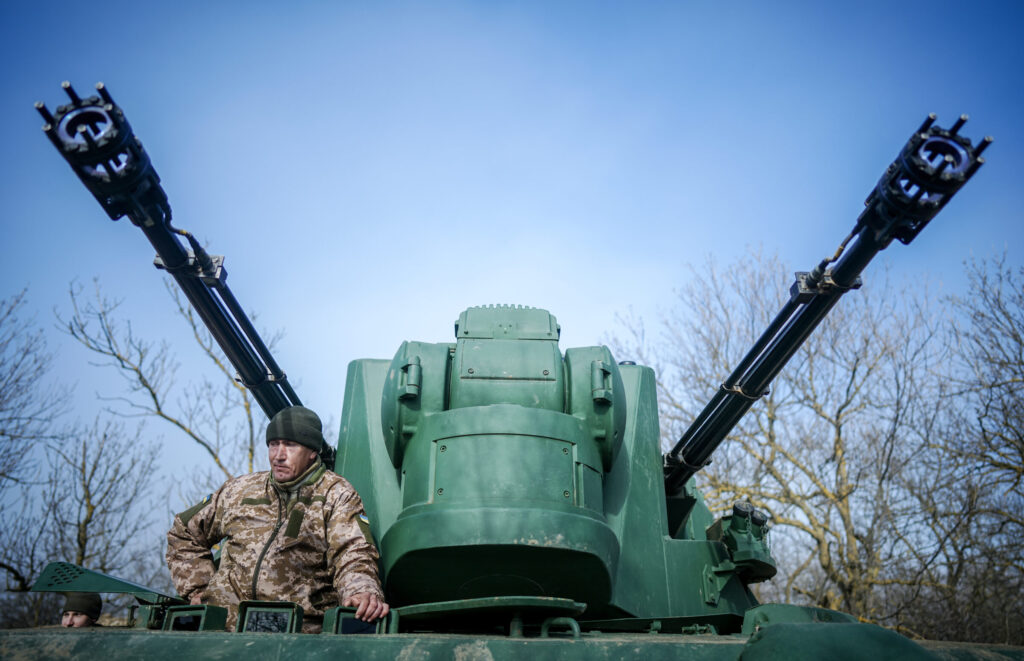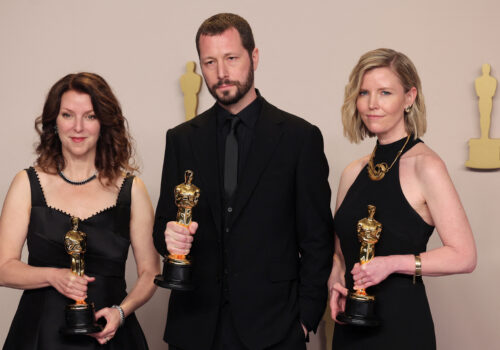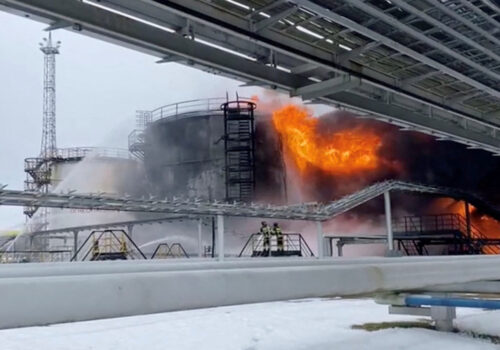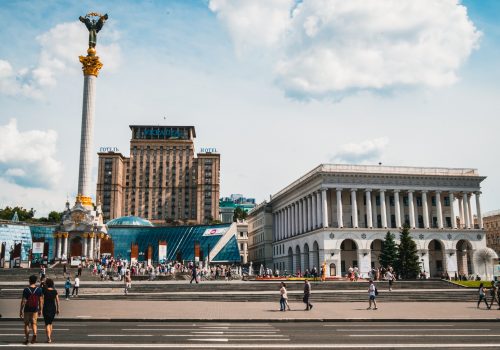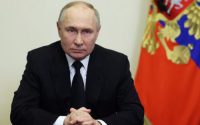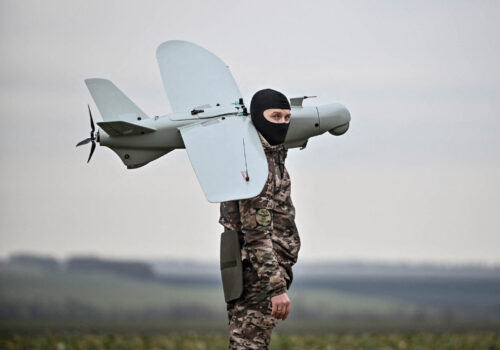
Peace is impossible until Ukraine is safe from future Russian aggression
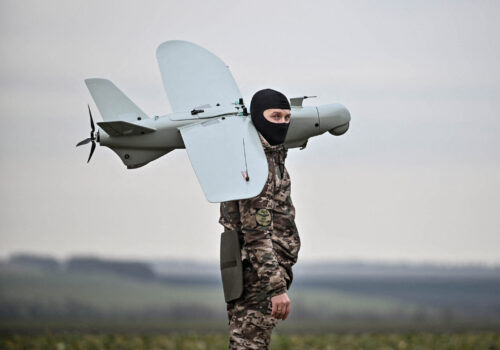
A series of news items in recent weeks have reignited the simmering debate over a possible peace deal to end the Russian invasion of Ukraine. While none of these developments provided a plausible roadmap toward a sustainable settlement, they did help highlight some of the key obstacles preventing a return to the negotiating table.
The first significant development was the March 1 publication by the Wall Street Journal of a draft peace agreement that was drawn up during the initial stages of the invasion before being abandoned amid a breakdown in talks. Russian President Vladimir Putin has repeatedly referred to this document as alleged proof that he was ready to end the war but was rebuffed by Ukraine following intervention from Kyiv’s Western partners.
On closer inspection, however, it is clear that the terms proposed by Moscow in April 2022 would have left Ukraine severely weakened and virtually helpless against further rounds of Russian aggression. The agreement would have meant ceding land to Russia, condemning millions of Ukrainians to permanent Russian occupation, drastically reducing the strength and size of the Ukrainian army, and preventing the country from entering into any military cooperation with the West.
If these punishing terms had been implemented in spring 2022, It would surely only have been a matter of time before a disarmed and isolated Ukraine found itself facing a fresh Russian invasion with little hope of defending itself. In other words, Putin’s widely touted peace proposal was in fact an attempt to secure the surrender of the Ukrainian state.
Stay updated
As the world watches the Russian invasion of Ukraine unfold, UkraineAlert delivers the best Atlantic Council expert insight and analysis on Ukraine twice a week directly to your inbox.
The publication of Putin’s punitive peace plan did not deter Pope Francis from entering the debate in early March with his own controversial call for Ukraine to “have the courage to raise the white flag” and negotiate with Russia. The Pope’s comments sparked outrage in Ukraine and across Europe, with a number of senior officials condemning the religious leader. Days later, the Vatican was forced to backtrack, with Cardinal Pietro Parolin clarifying that the onus in any future peace process should be on Russia as the “aggressor” country.
The most ominous recent contribution to the debate over possible future negotiations has come from Hungarian Prime Minister Viktor Orban. Following his meeting with former US President Donald Trump in Florida, Orban announced that if re-elected in November, Trump plans to cut all US support for Ukraine. “If the Americans don’t give money, the Europeans alone are unable to finance this war. And then the war is over,” commented the Hungarian leader.
These revelations were not entirely unexpected. Indeed, the current deadlock in Congress over US military aid for Ukraine is widely seen as a reflection of Donald Trump’s personal position. Nevertheless, Ukrainians were dismayed by Orban’s claims that Trump’s vision for peace amounts to abandoning Ukraine and letting Russia win. Far from ending the war, this approach would mean the end of Ukraine.
Putin himself has since underlined the obvious flaws in Trump’s strategy. In a March 13 interview, the Kremlin dictator dismissed the idea of peace talks at a time when his army has regained the battlefield initiative thanks in large part to Ukraine’s mounting weapons shortages. “It would be ridiculous for us to start negotiating with Ukraine just because it’s running out of ammunition,” Putin stated.
Eurasia Center events

At present, the potential negotiating positions of Russia and Ukraine remain poles apart. While Kyiv insists on a complete end to the Russian occupation of Ukrainian territory and the payment of reparations for war damage, the Russian leadership is becoming more and more maximalist in its demands. Putin and other senior officials have long insisted Ukraine cede five partially occupied provinces to Russia. With Russia’s military prospects improving and international support for Ukraine wavering, the Kremlin now appears to embracing even more ambitious goals.
Putin used his high-profile February 2024 interview with US media personality Tucker Carlson to position the war as an historic mission to reclaim “Russian lands.” Meanwhile, former Russian President Dmitry Medvedev has gone even further, declaring in early March that “Ukraine is definitely Russia.”
These maximalist statements tally with the Kremlin’s increasingly vitriolic anti-Ukrainian propaganda, which portrays Ukraine as an enemy of Russia and an instrument of the West’s anti-Russian policy. For the past two years, the invasion of Ukraine has been depicted by the Kremlin as an existential struggle, with Russia’s national survival dependent on the total subjugation of Ukraine.
This framing makes it difficult to see how any kind of negotiated settlement could prove enduring. On the contrary, while Moscow may seek to temporarily pause hostilities for strategic reasons, it is now obvious that the Putin regime has committed Russia to a long-term war of aggression with the clear goal of destroying Ukraine.
Ukrainians are well aware of Russia’s genocidal agenda. They see the daily incitement to genocide on Kremlin TV, and are regularly confronted with fresh evidence of efforts to eradicate Ukrainian identity throughout occupied regions of Ukraine. Understandably, the vast majority of Ukrainians see no room for compromise between Russian genocide and their own survival. Instead, they are committed to fighting on until Ukraine can achieve the basis for long-term national security.
There are indications that Ukraine’s partners are increasingly recognizing the need for comprehensive security guarantees. Since January 2024, Ukraine has signed a series of bilateral security agreements with partner countries including Britain, France, and Germany. While these documents do not qualify as military alliances, they do formalize current cooperation while outlining avenues for future defense sector partnership.
In recent weeks, French President Emmanuel Macron has raised the stakes further by refusing to rule out the deployment of Western troops to Ukraine. Macron’s suggestion has sparked considerable alarm among European leaders, but supporters have noted that the West gains nothing by signalling its own red lines to the Kremlin. Bilateral security agreements and the French President’s increasingly bold rhetoric cannot replace the unrivaled security provided by NATO membership, but these recent developments do indicate growing recognition in Western capitals that European peace depends on a secure Ukraine.
With Russia’s invasion now in its third year, factors such as Ukraine’s failed 2023 counteroffensive and creeping Ukraine fatigue among the country’s Western partners are contributing to calls for a compromise settlement to end the war. At the same time, Putin appears more confident than ever that he can achieve his expansionist goals and is clearly in no hurry to return to the negotiating table.
In the current circumstances, the best way to secure a lasting peace is by demonstrating to the Kremlin that Russia’s hopes of extinguishing Ukrainian statehood are futile. Putin only understands the language of strength. With this in mind, Ukraine’s international partners must send an unambiguous message to Moscow by ditching their “as long as it takes” mantra and deploying the full weight of their overwhelming economic and technological superiority. This would be more than enough to give Ukraine a decisive battlefield advantage and set the stage for victory over Russia.
Nobody wants peace more than the Ukrainians themselves, but they also recognize that a premature peace with Putin would only lead to more war. Advocates of a negotiated settlement would be wise to listen to these Ukrainian concerns before calling on Kyiv to compromise with the Kremlin. As Winston Churchill observed, meeting jaw to jaw is better than war. However, in this particular case, it should be evident to all that there can be no durable peace in Europe until Ukraine is safe from Russian aggression.
Mykola Bielieskov is a research fellow at the National Institute for Strategic Studies and a senior analyst at Ukrainian NGO “Come Back Alive.” The views expressed in this article are the author’s personal position and do not reflect the opinions or views of NISS or Come Back Alive.
Further reading
The views expressed in UkraineAlert are solely those of the authors and do not necessarily reflect the views of the Atlantic Council, its staff, or its supporters.

The Eurasia Center’s mission is to enhance transatlantic cooperation in promoting stability, democratic values and prosperity in Eurasia, from Eastern Europe and Turkey in the West to the Caucasus, Russia and Central Asia in the East.
Follow us on social media
and support our work
Image: A Gepard anti-aircraft gun tank and its crew stand in a position east of Odessa. The tank supplied by Germany is used here to defend against enemy drones, aircraft and helicopters. 24.02.2024 marks the second anniversary of the start of Russia’s war of aggression against Ukraine.
